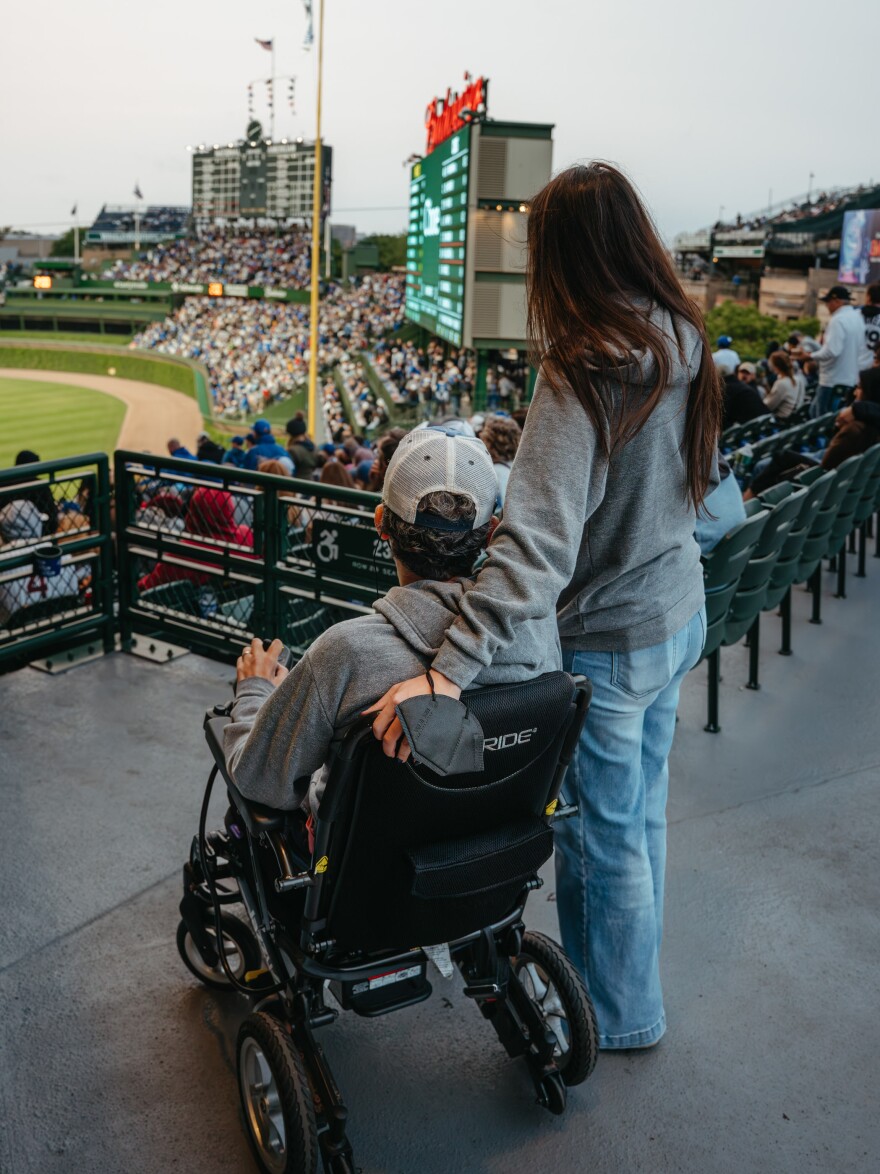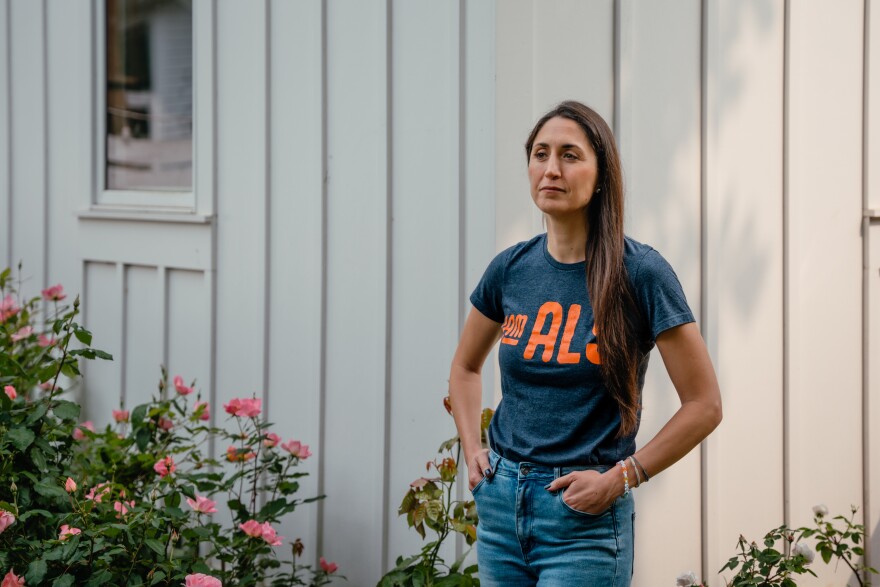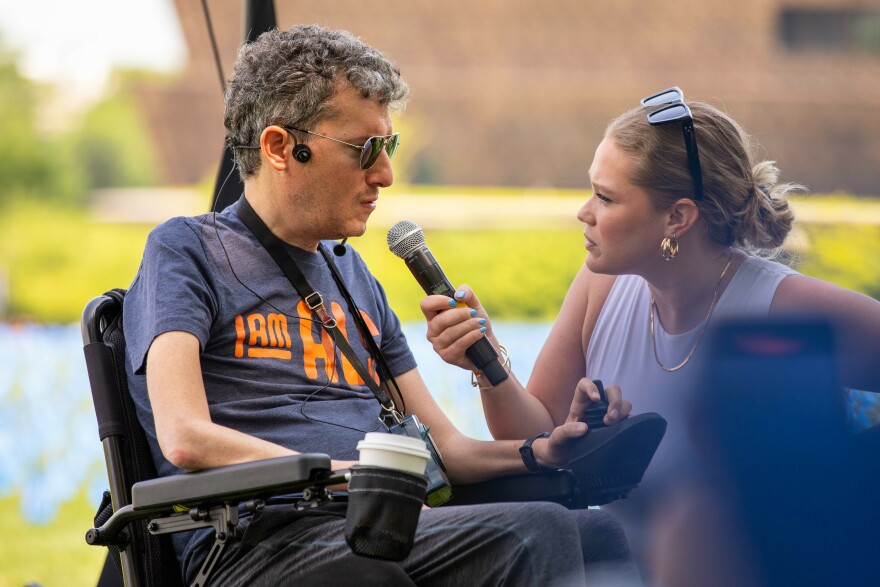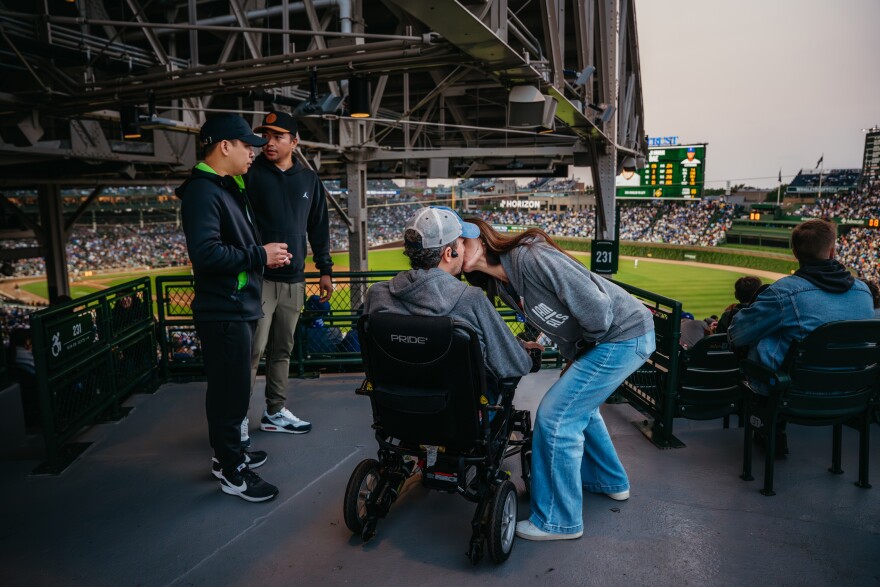On a recent crisp June night, as the Chicago Cubs prepare to take on the Pittsburgh Pirates, fans dressed in blue pack Wrigley Stadium's famous bleachers.
Sitting in his wheelchair, 42-year-old Brian Wallach looks out over the park, rooting for a very particular outcome that has nothing to do with baseball.
He has amyotrophic lateral sclerosis (ALS) — sometimes referred to as Lou Gehrig's disease, named for the baseball legend once dubbed the "iron horse" because of his durability, before the disease took his life.
At the gates of the stadium, ballpark staff hand out bright blue T-shirts with the Cubs logo and the words, "End ALS for Lou." The night is part of a growing movement to highlight ALS and spread awareness of the toll it has wrought on people.

For Wallach, a former assistant U.S. attorney who once worked for Barack Obama, his specialty is turning that goodwill into action in the ALS community, the halls of Congress and the Oval Office. And he has used his connections to change the face of medical advocacy in this country.
He's not done yet, but the clock is ticking.
How the president was moved to act
Wallach was diagnosed six years ago, on the day that he and his wife, Sandra Abrevaya, brought the newborn second daughter home from the hospital.
"Sandra and I cried and we held our family tight. We did so because being diagnosed with ALS today is a death sentence. There is no cure. I will not see my daughters grow up," Wallach told Congress during testimony he gave in 2019.

ALS is a cruel disease. It gradually robs a person's body of its motor skills until the ability to walk, talk, stand and eat are gone. About 5,000 people in the U.S. are diagnosed every year.
Wallach is already something of an outlier, given that most people with ALS die within two to five years of diagnosis — although some people live 10 years more, or even longer. Wallach and Abrevaya's mission is to one day make ALS a chronic disease, rather than a fatal one.
"I authentically believe that my generation of ALS patients can be the first generation with ALS to survive, and that hope is driven by what we are seeing in the research and drug development," Wallach said.
In January 2019, the couple launched I Am ALS, galvanizing the voices of people living with the disease and those who love them. It's more than just a network of dedicated advocates — it created a patient-centered movement fighting for research and government funding.
Its tagline is, "ALS is relentless. So are we." And it's been enormously successful to date.


Wallach has testified three times before Congress since his diagnosis. More recently, ALS has significantly weakened his voice and Abrevaya has helped him deliver his testimony.
"This is the closing argument for our lives," Wallach told House lawmakers in July 2021. "We want to live. You have the power to make that possible."
Months later, something happened that can feel almost impossible in a deeply divided Washington. President Joe Biden signed into law a bill known as ACT for ALS, which expanded federal research and gave patients speedier access to treatments still under FDA review.
The bill had broad bipartisan support, and passed in the Senate unanimously. Biden thanked Wallach and Abrevaya when he signed the bill into law in December.
The pair chalked up the rare bipartisan show of force in Washington to one thing: humanity.
"When you go to someone and you ask them for help in saving your life, it is a moment where politics fade away, and it becomes about the humanity of the people who are sitting right in front of you," Wallach told NPR in his suburban Chicago home earlier this month, as Abrevaya repeated his words for clarity.
While the law is a cause for optimism, Wallach and Abrevaya are fighting for more.

Wallach recently traveled to Washington again, and spent two hurried days meeting with lawmakers on Capitol Hill to secure even more funding, and to ensure that the money he had already fought for didn't get cut in the debt ceiling fight, which was raging at the time.
Wallach, who now uses a motorized wheelchair, navigated his way around the Capitol complex for meetings with a dozen members from both parties. He had to work hard to be heard, using a microphone and speaker to amplify his voice, with an executive assistant filling in the gaps.
Among those he met with was Illinois Rep. Mike Quigley, a Democrat, who Wallach worked with closely during the push for ACT for ALS.
"We got it done," Wallach told Quigley. "That wouldn't have happened without you and your staff finding every single holdout and telling them that they could not leave until you agree to co-sponsor the bill."
At home in suburban Chicago, Wallach and Abrevaya take stock of what they have achieved so far, but also what the last six years have cost them.
Reimagining what life looks like
The couple's house is light filled and full of life. Their daughters have sticky, sweet summer treats in hand, and are getting ready to head out to the pool.
Photos of the girls, now five and seven years old, hang above the fireplace. On the mantle, there's a photo of Wallach – before his diagnosis – standing alongside Obama in the Oval Office.

Wallach and Abrevaya met while working on Obama's 2008 presidential campaign in New Hampshire. He served in the White House Counsel's office during Obama's administration, and later was an assistant U.S. attorney in Chicago.
The couple knows their background gives them the kind of access, network and influence that many ALS patients don't have. And that's exactly the point.
"I think that's in large part why we decided we had to do I Am ALS, because the key question was: What can the two of us add to this fight," Abrevaya said.
Wallach and Abrevaya moved into this house in 2018, wanting to be as close to Abrevaya's family as possible as they raised their young family and monitored the progression of Wallach's ALS.
They had to completely remodel the house to better fit his needs, including adding a first floor bedroom, which also doubles as his office.
Wallach said that before his diagnosis, he often worked 14 hours a day. Now, he's pared it back to just nine.
"It gives me a sense of purpose, and a sense of power that the disease is trying to take away," he said of keeping up the work.
Many people, when faced with a terminal diagnosis of ALS, would not pour themselves into work at a breakneck pace the way Wallach and Abrevaya have.


"I'm not the optimist Brian is by nature," Abrevaya said. "But I do genuinely wake up every morning convinced that if I fight hard enough, we still have a chance for him to live and survive this disease," she said. "And so I throw my whole body, my whole self at this every single day, every single morning, until typically we pass out at night."
"I wake up every day, and I realize that I want to live and see many more days," Wallach added. "And I want that for every family fighting this disease."
Wallach's diagnosis meant that Abrevaya's life changed, too. She became a full-time caregiver to her once active young husband when they were both in their late 30s, and raising young kids.
The early years of managing Wallach's ALS without any help, Abrevaya said, were brutally difficult, with her husband fully reliant on her for all of his needs.
"For several months, I didn't leave Brian's side for a moment," she said. "I literally slept by his side to make sure that he didn't have trouble breathing in the middle of the night. And I woke up with just like, even a fear or an inkling of his breathing being off, and adjusted his BIPAP breathing machine."
Abrevaya said that care for Wallach now costs somewhere around $300,000 a year, a price that many families and caregivers can't afford. Wallach and Abrevaya receive help from family and friends to cover the costs.
"When people can't afford that, their entire life is imprisonment. They are imprisoned as a caregiver. And while they may not be the one diagnosed, they've been given a sentence. And it is a total tragedy," Abrevaya said, before turning to Wallach and adding: "But I still love you."


Wallach's diagnosis has, understandably, changed the contours of their marriage, and their family.
"One thing that's been hard as a young couple with this disease is it takes away from you part of what you thought your life would be like," Abrevaya said. "I am also rooted in what we do have, but I walk the girls to school and I notice other couples walking and holding hands. My God, that would be really nice. Like, that's so simple, so beautiful. And we've been robbed of that."
Above all else, Abrevaya and Wallach want their daughters to have lives that are not defined by what ALS has taken from their family.
"Our younger daughter has $5 saved and talks to me about how she plans to use most of it for Brian's medication," Abrevaya said. "I work really hard to try to make their lives joyful in spite of all of this."
A simple hope for what comes next
It's not yet clear what Wallach's future will look like.
The neurodegenerative disease he was diagnosed with has changed everything about the life he'd planned for himself, and it will likely kill him. But that is not the future that Wallach and Abrevaya think about. The one they focus on is simpler.

"Being 70 and sitting on the front porch with Sandra, and sipping lemonade, and just enjoying our time together," he said. "And I know that our daughters will come by often and make a lot of noise."
"I stay really focused on that vision," Abrevaya added. "We don't want anything in life except to live. That's the dream. Just to survive."
Copyright 2023 NPR. To see more, visit https://www.npr.org.





